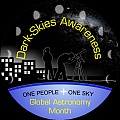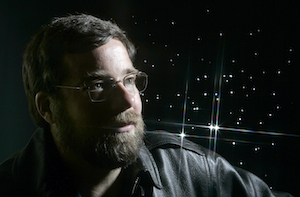For GAM 2012 use the menu on the right side below
|
April 6, 2012 By Scott Kardel |
Back to the GAM DSA Blog |  |
| Gobal Astronomy Month is not only a time to share and enjoy the night sky. It is also a time to learn about how to save it. The stars above are vanishing behind the glow of civilization and for the first time in human history most people do not live where they can see the Milky Way. |
||
The dramatically beautiful night sky imagery of The World at Night can serve to inspire those who live under the shroud of light pollution. While these fantastic images of the night capture more than the eye can see, they are no substitute for experiencing the night sky for your self. Yes, it can be difficult to escape the urban glow, but the effort is rewarding. For some it is life changing.

The Milky Way from western Austria by Babak A. Tafreshi/TWAN
Those of us that have taken on the challenge of fighting light pollution have had that life changing experience. We know that we do not have to live under light polluted skies. That it is possible to properly illuminate exactly what people need to see without shining light directly into the heavens. Proper illumination actually increases visibility by reducing glare and providing for more even illumination without harsh shadows. It not only fights light pollution but it also saves energy and money while introducing less greenhouse gases into the atmosphere. At the same time good nighttime illumination protects wildlife. Remember, unlike most of us, residents of the natural world cannot pull a curtain to block out an obtrusive light.
There are many reasons to fight light pollution and only one that I can think of not to do so. Ignorance. Once people have been exposed to the problem and see how easy the solutions are, they get it. They see that while the problem is large, it can be solved and that the solutions make the world a better place.
Global Astronomy Month's Dark Skies Awareness (DSA) programs seek to motivate people everywhere to help document the problem of light pollution and to take action that will lead to its diminishment. Over the next several blog posts I will be highlighting some of the activities and programs in the DSA and what you can personally do to make a difference. Remember every light counts. Diming or shielding just one bad light makes an improvement over the way it was before.
I hope that you will join the cause and make the world a better place.
|
|
Scott Kardel has always had a love for astronomy and the universe. Growing up in the desert on the edge of Tucson, Arizona gave him a strong connection to the sky and the environment. He works for the International Dark-Sky Association helping to defend the night and was previously at Palomar Observatory. There he directed their public outreach programs and was the observatory’s representative on light pollution issues. |








